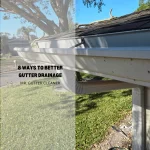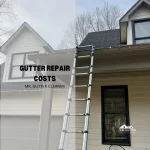Gutter guards represent a significant development in home maintenance, offering a solution to the perennial issue of gutter clogging.
These devices, designed to block debris while allowing water to flow freely, can potentially save homeowners from frequent gutter cleanings.
Gutter guards come in various types, each with its unique mechanism of action, advantages, and limitations.
From mesh and screen models that filter out leaves and twigs to foam and brush types that sit inside gutters to prevent debris accumulation, the choices vary widely.
The effectiveness of these guards in preventing clogs is a critical concern, with real-world performance depending on several factors including the type of debris, roof slope, and guard design.
The decision to install gutter guards involves considering their impact on reducing maintenance efforts and costs over time.
Installation can be undertaken as a DIY project or through professional services, with each option presenting its own set of considerations.
This introduction sets the stage for a detailed exploration of whether gutter guards are a worthwhile investment for homeowners seeking to improve their home maintenance practices.
What Are Gutter Guards?
Gutter guards serve as protective devices installed over gutters to prevent debris from entering while allowing water to flow freely. These tools play a pivotal role in home maintenance by reducing the need for frequent gutter cleanings and protecting the home’s foundation from water damage.
By blocking leaves, twigs, and other debris, gutter guards ensure that water can drain effectively, preventing overflow and the associated risks to a home’s structure.
What Is the Purpose of Gutter Guards?
The primary purpose of gutter guards is to maintain the functionality of gutters by minimizing blockages. This leads to decreased maintenance requirements and prolongs the life of the gutter system. Effectively, gutter guards reduce the labor and costs associated with gutter cleaning, making them a valuable consideration for any homeowner looking to optimize their home maintenance practices.
How Gutter Guards Preserve Your Home’s Foundation
By ensuring that water is efficiently channeled away from the home, gutter guards play a crucial role in preserving the foundation. When gutters become clogged, water overflows and pools around the foundation, which can lead to erosion, basement flooding, and structural damage over time. Gutter guards mitigate these risks by keeping the gutters clear, thus protecting the home’s foundation and maintaining the structural integrity of the property.
How Do Gutter Guards Work?
Gutter guards function by creating a barrier over the gutter system that allows water to enter while keeping out debris such as leaves, twigs, and pine needles. This mechanism ensures that gutters remain unobstructed, promoting efficient water flow and reducing the risk of gutter overflow and blockages. The design of gutter guards varies, but the goal remains consistent: to protect the gutter from becoming clogged with debris, which can lead to water damage to the home’s exterior, foundation, and landscaping.
The Mechanism Behind Gutter Guards
The operational principle behind gutter guards is simple yet effective. They employ physical barriers, such as mesh screens, foam filters, or slit covers, to separate water from debris. Water, due to its surface tension, flows over these barriers into the gutter, while debris is either washed over the edge or remains on top, eventually to be blown away by the wind. This process significantly reduces the amount of debris that enters the gutters, thereby maintaining clear pathways for rainwater.
Variations in Gutter Guard Designs and Their Efficiency
There are several types of gutter guards, each with its own set of advantages and efficiency levels. Mesh and screen guards provide a physical barrier that filters out debris while allowing water to pass through. Foam and brush guards fit inside the gutters, blocking debris from entering while letting water soak through. Surface tension guards, also known as reverse curve guards, use the principle of water adhesion to direct rainwater into the gutters while shedding debris off the edge. The efficiency of each type varies based on factors such as the surrounding environment, the type of debris commonly encountered, and the gutter system’s configuration. Selecting the right gutter guard type depends on these factors, aiming to optimize gutter performance and longevity.
Types of Gutter Guards: Pros and Cons
Gutter guards come in various designs, each suited to different environments and types of debris. Understanding the pros and cons of each type helps homeowners select the most effective solution for their gutter maintenance needs.
Mesh vs. Screen: Which Is Better for Your Home?
Mesh gutter guards feature fine mesh screens that filter out almost all debris, from leaves to pine needles, allowing only water to pass through. Their efficiency in keeping gutters clean is high, making them a popular choice among homeowners. However, the fine mesh may need occasional cleaning to prevent clogging with tiny particles and seeds. Screen guards, on the other hand, are easier to install and clean but might not filter out smaller debris as effectively as mesh guards.
Foam and Brush Gutter Guards: Are They Effective?
Foam gutter guards are inserted directly into the gutter, allowing water to pass through the foam while blocking debris from entering. They are easy to install but may require more frequent maintenance to prevent mold and mildew growth. Brush gutter guards, consisting of bristle brushes inserted into the gutters, work similarly by trapping debris on top while letting water flow through. They can be effective but may not prevent smaller debris from getting trapped in the bristles, necessitating periodic cleaning.
Surface Tension Guards: How Do They Compare?
Surface tension gutter guards, also known as reverse curve guards, are designed to allow water to flow over the guard and into the gutter while debris falls to the ground. They are highly effective at preventing large debris from entering the gutters and typically require professional installation. The main disadvantage is their visibility from the ground, which may not appeal to all homeowners, and the potential for the water to overshoot the gutter in heavy rainfalls.
Are Gutter Guards Effective in Preventing Clogs?
Gutter guards are designed to reduce the frequency and necessity of gutter cleaning by preventing leaves, twigs, and other debris from entering the gutters, thereby minimizing the risk of clogs. Their effectiveness, however, can vary based on several factors, including the type of gutter guard, the environment surrounding the property, and the installation quality.
Real-world Performance: Do They Live Up to the Hype?
In real-world applications, gutter guards significantly decrease the amount of debris that enters the gutters, thus reducing the likelihood of clogs. Homeowners report fewer instances of overflow and water damage, pointing to the efficacy of gutter guards in maintaining clear gutter pathways.
However, no gutter guard system can eliminate the need for gutter maintenance entirely. Over time, small particles like pine needles, seeds, and shingle grit may still accumulate and necessitate occasional cleaning, though much less frequently than unguttered systems.
Limitations and Considerations for Gutter Guard Effectiveness
While gutter guards are effective in preventing large debris from clogging gutters, they are not a foolproof solution. The effectiveness of gutter guards is contingent upon correct installation and the local environment. Trees in close proximity to the home, for instance, may increase the volume of debris, impacting the performance of gutter guards.
Additionally, different types of gutter guards have specific strengths and weaknesses; for example, mesh guards may become clogged with small particles, whereas foam inserts may need replacement due to deterioration over time. Homeowners must also consider potential issues like ice dams in colder climates, where gutter guards may not provide a solution.
The Impact of Gutter Guards on Home Maintenance
Gutter guards significantly influence home maintenance routines by offering a preventive solution to gutter clogs and potential water damage. Their installation is a proactive step towards reducing the time and resources dedicated to gutter cleaning, while also extending the lifespan of the gutter system itself.
Can Gutter Guards Reduce Overall Maintenance Costs?
By preventing debris accumulation, gutter guards can notably decrease the need for frequent gutter cleanings. Homeowners often find that the initial investment in gutter guards pays off through reduced cleaning expenses and lessened potential for costly water damage repairs to foundations, basements, and landscapes. While the upfront cost of purchasing and installing gutter guards can be substantial, the long-term savings on maintenance and repair work often justify the investment, especially in areas prone to heavy leaf fall or severe weather conditions.
The Long-term Benefits of Installing Gutter Guards
Beyond cost savings, the long-term benefits of gutter guards extend to increased property protection and convenience. By maintaining clear gutters, they help prevent water overflow that can lead to foundation damage, soil erosion, and basement flooding. Gutter guards also contribute to the overall health of a home’s exterior by mitigating the risk of rust and rot in the gutter system, thereby prolonging its functionality. Additionally, for homes located in regions with seasonal wildfire risks, gutter guards can reduce fire hazards by preventing the accumulation of dry leaves and debris.
Installation Considerations: DIY vs. Professional Services
Deciding between DIY and professional installation of gutter guards involves weighing factors like cost, time, and the complexity of the installation process. DIY installation can offer cost savings and is feasible for certain types of gutter guards; however, it requires a certain level of skill and safety considerations when working at heights. Professional installation, while more costly, ensures that gutter guards are correctly installed for maximum effectiveness and often comes with the benefit of warranties. It is crucial for homeowners to assess their capability and the specific requirements of their chosen gutter guard system before deciding on the installation method.
Evaluating the Value of Gutter Guards for Your Home
Determining whether gutter guards are a worthwhile investment for your home involves analyzing their benefits in relation to cost, maintenance reduction, and the protection they offer against potential gutter-related issues.
Balancing Costs and Benefits
The value of gutter guards comes from their ability to reduce the frequency and necessity of gutter cleaning, thereby potentially saving homeowners on maintenance costs over time. When evaluating their cost-effectiveness, it’s essential to consider the initial installation expense against the savings on professional gutter cleaning services and the reduced risk of water damage to the home. The benefits extend beyond financial savings, including less time spent on home maintenance and increased safety by reducing the need for homeowners to climb ladders for gutter cleaning.
Making an Informed Decision
To make an informed decision about gutter guards, homeowners should assess their home’s surrounding environment, including the type and amount of debris typically encountered. The effectiveness of gutter guards can vary widely based on these factors, making some types more suitable for certain homes than others. Additionally, the quality of the gutter guard, warranty offerings, and the credibility of the installation service should be considered. Homeowners are encouraged to research and compare different gutter guard types and consult with professionals to understand the best options for their specific needs and budget.


